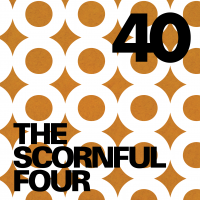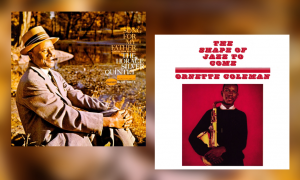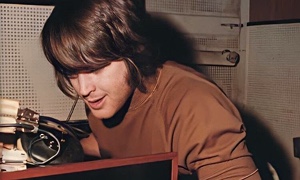Home » Jazz Articles » Building a Jazz Library » Henry Threadgill: 9 Plus Essential Albums
Henry Threadgill: 9 Plus Essential Albums

Courtesy Julie Gulenko
The beauty of Henry Threadgill is how he upends the idea that listeners need to 'get' music to enjoy what they hear.
Thankfully, we live in a relative golden age to listen to him. Albums by Threadgill and his ensembles have been released by more than ten labels, most of them small independents. With disparate entities involved with their care, building a jazz library with his albums used to require a patient, piece-by-piece approach. Scouring used records stores and crate digging do have a certain appeal. Besides the episodic sense of accomplishment it brings, the process can take you to new places and introduce you to new people and friends. But one would not expect such resolute determination from those yet to sign on for all things Threadgill. With the benefit of specialty reissues, online retailers, streaming services and digital sales platforms, collectors and the curious can now get their hands and ears on most of the albums mentioned below in one fashion or the other with relative ease. Any future Threadgill completists inspired by this BAJL entry may need to make periodic checks of Discogs and Ebay to fill some gaps, but Threadgill's work is now remarkably discoverable compared to an earlier time.
Threadgill's discography has many doors through which to enter. All of them and where they go merit attention. With this being said, to present 9 Plus Essential Albums intends neither to snub nor to vacillate. Given his deliberate playfulness with words and numbers, it would seem out of place to make a Top Ten, too. Readers are invited to share their own Threadgill "essentials" in the comments section below. Preferred outlets and stratagems for building a Threadgill library are heartily welcomed.

Zooid
Poof
Pi
2021
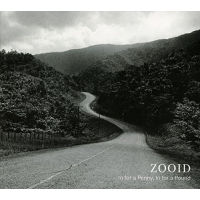
Zooid
In for a Penny, In for a Pound
Pi
2015
Threadgill's work with his longest running band, Zooid, provides as appropriate a place as any to introduce people to him. For as much as he seems to change, Zooid could be just a new variation on his long-running interest in jazz bands as classical chamber groups—or maybe it should be the other way around.
Critic Stanley Crouch noted "Third Stream elements" (i.e., melding of classical and jazz) in the work of his first band, the trio Air with Threadgill (alto saxophone, flute, bass flute), Fred Hopkins (bass), and Steve McCall (drums). The first lineup he led, with which he recorded X-75 Volume 1 (Arista/Novus, 1979), included three additional players on reed and wind instruments, four bassists and a vocalist. Jon Pareles' New York Times review of Subject to Change (About Time, 1985) highlighted his then-current Sextet, which also included Threadgill, two drummers, trumpet, trombone, cello and bass as "the world's most compact orchestra" and "a lineup that's more flexible than a campaign promise." His next steps, Very Very Circus and Make a Move, employ similarly rich instrumentation atypical for jazz. Zooid on Poof consists of Threadgill, two artists from the unit's inception—Liberty Ellman (acoustic guitar) and Jose Davila (trombone, tuba)—along with Christopher Hoffman (cello) and Elliot Humberto Kavee (drums, percussion).
A 2021 review of Poof by Michael J. West on the Bandcamp website presents a valuable discussion of how the album takes cues from classical concertos in the group's orientation and execution (it comes recommended). It also cogently describes how Zooid adheres to unique rules for how musicians play off each other and improvise as an organic whole with some structure but ultimate openness to where things go. Threadgill and his bandmates have, in effect, devised their own way that music "makes sense" akin to the work of artists like Arnold Schoenberg, known for his twelve-tone technique, and later-career Ornette Coleman and his harmolodic ideas.
Despite the headiness that the preceding discussion implies, the beauty of Henry Threadgill is how he upends the idea that listeners need to "get" music to enjoy what they hear. Blending composed and improvised music played by a veritable mini-orchestra with unique-for-jazz instrumentation, Poof twists, turns and surprises with ingenious beats, pulses, and grooves. Is it jazz? While it may depart from common conceptions of it, the jazz press, clubs and listening public still claim him. In its running length, able to fit on one LP or a side of a 90-minute cassette, Poof shows a restraint that could be another Threadgill hallmark. While compact discs allow for more music to be included, even after the CD's arrival Threadgill rarely goes beyond LP-era constraints. There is a time for all good music to go "poof."
In for a Penny, In for A Pound, the album for which he won the Pulitzer, is a double shot of Zooid, completely aware of itself as such, and it is essential Threadgill. Its two-LP-length construction allows the featured instruments more room to shine in their settings. With each disc beginning with an introduction not built around a featured player, the overall work achieves a balance in its more-is-more presentation.
The Pi albums referenced throughout this BAJL entry are generally available from major online retailers and digital sales sites, specialty online retailers, the label itself (company webpage and Bandcamp) and streaming platforms. A brick-and-mortar store may even have some in stock. Some, but not all, have LP releases.
Plus album: Zooid, Tomorrow Sunny/The Revelry, Spp (Pi, 2012). This may best present Threadgill as composer of songs for Zooid, not to mention just how swinging they can be. Like Poof, it drives home a less-is-more aesthetic in its running length.
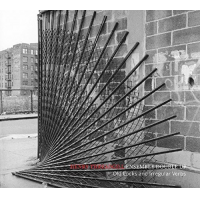 Ensemble Double Up
Ensemble Double UpOld Locks and Irregular Verbs
Pi
2016
Threadgill may not seem like an inviting composer/arranger for players outside the ranks of Zooid. But this is not the case. A 2019 performance by Zooid with the Oberlin Contemporary Music Ensemble of the piece "Pathways" commissioned by the Cleveland Museum of Art, well demonstrated the elasticity of the unit's membrane to incorporate new voices. It may have taken some rehearsal, but they more than pulled it off.
Old Locks and Irregular Verbs provides another witness to Threadgill methods taken up by non-regulars. Originally commissioned and performed in 2014, the album honors the memory of friend and colleague Lawrence Butch Morris—someone who also brought avant-garde insight to composing for large ensembles. As a Threadgill album, Old Locks and Irregular Verbs is unique in that he sits out the performance itself.. With regard to instrumentation, the alto saxophones, tuba, cello and drums are, of course, de rigueur, with two members of Zooid in this mix. The twin-firing pianos of Jason Moran and David Virelles make the album special within the Threadgill discography. With its moving, elegiac conclusion the entire work achieves a sonic uniqueness, reverence and emotional heft that bring to mind Miles Davis' 32-minute ambient Duke Ellington homage "He Loved Him Madly."
Plus albums: 14 or 15 Kestra: AGG, Dirt... And More Dirt (Pi, 2018); Ensemble Double Up, Plays Double Up Plus (Pi, 2018). Released in the same year, they likely cannibalized themselves in the year-end critics' lists.
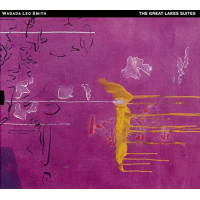 Wadada Leo Smith
Wadada Leo SmithGreat Lakes Suites
TUM
2014
A colleague from Threadgill's early-career with the Chicago-based Association for the Advancement of Creative Musicians (AACM), Wadada Leo Smith is another jazz artist who gets Pulitzer consideration for ambitious work. On its own merits, this majestic two-CD recording with Smith, fellow AACM alum Jack DeJohnette (drums) and John Lindberg (bass) is a consummate work of art expressive of the state of creative music and avant-garde jazz in the 21st century. The nature of the quartet setting also provides a great chance to take in Threadgill as a preeminent saxophonist-flautist, like Charles Lloyd and Sam Rivers. For those unfamiliar with the deep resonance of the bass flute, Threadgill casts a spell with it to open "Lake Erie."
Releases from the Finnish TUM Records label are not available on streaming platforms or as downloads, but specialty online retailers, like Squidco, as well as the major ones are often good bets to find them.
Plus album: Jack DeJohnette, Made in Chicago (ECM, 2015). Another reunion with AACM veterans, including Roscoe Mitchell and Muhal Richard Abrams, that carries 1960s experimentalism forward into the 21st century. As an ECM release, it is widely available.
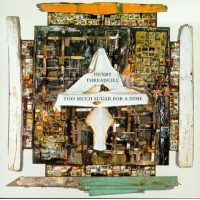 Very Very Circus
Very Very CircusToo Much Sugar for a Dime
Axiom
1993
Threadgill spent the first half of the 1990s working with Very Very Circus, a group noted for combining electric guitars and tubas. Co-produced by Bill Laswell, Too Much Sugar for a Dime doubles and even triples down on guitars and tubas with strings and more. The eclectic mashup results in an album that could be on a list of essential jazz albums of its decade. Vijay Iyer's piano trio rendition of the album's "Little Pocket Size Demons" on Accelerando (ACT, 2012) testifies to its lasting impact on musicians operating in its wake.
A promotional version of the out-of-print CD with just two of its tracks was once more common in used record shops than the record itself. Now one can download it all from Laswell's Bandcamp page. It is also among the Threadgill titles on Pandora. Upon their releases, two box sets, The Complete Novus & Columbia Recordings of Henry Threadgill & Air (Mosaic, 2010) and The Complete Remastered Recordings on Black Saint & Soul Note (Black Saint, 2010), improved the availability of Threadgill's work generally, including much by Very Very Circus. While these sets are harder to come by now, the individual albums included among them have migrated to major streaming and digital sales sites.
Plus album: Make a Move, Everybodys Mouth's a Book (Pi, 2001). One of two albums by this short-lived group, Pi Recordings made it their co-inaugural release with Zooid's Up Popped The Two Lips (Pi, 2001).

Henry Threadgill Sextet
Just the Facts and Pass the Bucket
About Time
1983

David Murray
Ming
Black Saint
1980
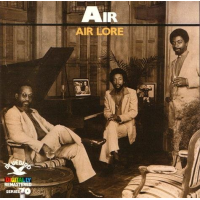
Air
Air Lore
Arista/Nous
1979
A dominant narrative about jazz in the 1980s concerns major record labels' embrace of neo-traditionalists, a.k.a. the Young Lions, and the impact of this backing relative to the avant-garde's commercial and artistic prospects. Threadgill stands out for having spent time with Novus, a division of Arista (and he was on Columbia for three albums in the 1990s), but he also recorded with the smaller labels that signed his fellow adventurers from Chicago and then New York. Sharing a common interest in jazz and traditions, the three albums grouped together here reframe expectations about artists' relationships with the past.
Threadgill made six albums with his seven-piece band with two drummers known as either the Sextet (three albums on About Time Records) or the Sextett (three albums on Arista/Novus). Opening with just its two percussionists, Just the Facts and Pass the Bucket should resonate immediately with the Grateful Dead and Allman Brothers faithful. From there the album displays the broad musical palette for which Threadgill is known. Drawing from classical, jazz, blues, funerals, fanfares, marches, the circus, etc., its heart and genius lies in an expansive embrace of what constitutes tradition.
Released in 1980, David Murray's Ming set a high and influential bar for the next decade of jazz. The octet that recorded it included a who's who of the downtown NYC scene. Besides Murray (tenor saxophone, bass clarinet) and Threadgill (alto saxophone), the octet included Steve McCall (drums) of Air; Butch Morris (cornet), to whom he paid tribute with Old Locks and Irregular Verbs; and Olu Dara (trumpet), a member of the Sextet for two albums including Just the Facts and Pass the Bucket and father of Nas. The Stanley Crouch-penned liner notes hit on the strands of Mingus, Ellington, and Parker throughout. He even refers to Dara's playing as having the "New Orleans nobility of Armstrong."
As it draws from and respects the past, Ming brings to the fore the avant-garde impulses embedded within tradition. Air Lore accomplishes a similar feat reinterpreting rags by Jelly Roll Morton and Scott Joplin. If the idea of an experimental, piano-less trio riffing on Morton and Joplin seems audacious, the album makes the case for jazz's origins as invigoratingly new themselves. Among the contemporaneous praise the album received was a DownBeat Critics Poll win for album of the year.
The conditions by which the individual albums on the Mosaic and Black Saint/Soul Note boxes are available digitally, discussed earlier, make Ming and Air Lore similarly easy to hear and buy. The same goes for the Sextett material on Arista/Novus. Of the three About Time Sextet records, only two have ever seen CD release, both of which were available, for a time, on iTunes. The specialty retailer Dusty Groove can be helpful for acquiring either of these and the LP-only Subject to Change. Fingers crossed that one day all three make their way to Bandcamp, like Laswell's Axiom albums.
Plus album: Wildflowers: The New York Loft Jazz Sessions (Douglas/Casablanca, 1977; Knit Classics, 1999). An enduring compilation of the creative voices in 1970s jazz centered in downtown NYC including Threadgill and Air, Murray, Dara and more. Originally released as five LPs, the set saw rerelease in 1999 on three CDs. It has been available on Spotify but is not currently. The Discogs site, a repository of album information and a marketplace, should list used copies for sale.
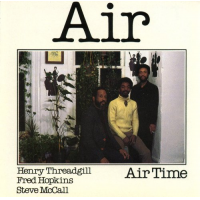 Air
AirAir Time
Nessa
1978
Air released nine albums in its original lineup with Threadgill, Hopkins and McCall. The group reconstituted as New Air in the early 1980s, first with Andrew Cyrille and later Pheeroan AkLaff on drums, with whom the band released two more albums. With such consistent output, all worth hearing, Air deserves recognition as one of the most significant groups of the 1970s along with, among others, Keith Jarrett's American and European quartets and the hugely successful fusion acts launched from Miles Davis' Bitches Brew band.
With the trio originally being connected to one another through the AACM, it was fitting that Chuck Nessa, a champion of the collective who recorded early, important work by the Art Ensemble of Chicago and its members, recorded this album with Air. Compared to other items in their discography, Air Time presents not just each member's instrumental prowess but their compositional gifts, too. The Hopkins composition "G.v.E." stands out for the potentially insidious bass work that threads the piece together. The track also showcases the unique Threadgill instrument the hubkaphone, a construction of hub caps, with which he recorded only once after Air, on the Zooid LP Pop Start the Tape, StoP (Hardedge, 2005).
The Nessa Records website has Air Time available for sale as CD or limited edition LP. Dusty Groove, again, can be a resource.
Plus album: An intrepid high school marching band could get a lot of people on their feet drawing from "Card Two: The Jick or Mandrill's Cosmic Ass" from Open Air Suite (Arista/Novus, 1978). I will leave it at that.
Tags
PREVIOUS / NEXT
Support All About Jazz
 All About Jazz has been a pillar of jazz since 1995, championing it as an art form and, more importantly, supporting the musicians who make it. Our enduring commitment has made "AAJ" one of the most culturally important websites of its kind, read by hundreds of thousands of fans, musicians and industry figures every month.
All About Jazz has been a pillar of jazz since 1995, championing it as an art form and, more importantly, supporting the musicians who make it. Our enduring commitment has made "AAJ" one of the most culturally important websites of its kind, read by hundreds of thousands of fans, musicians and industry figures every month.











